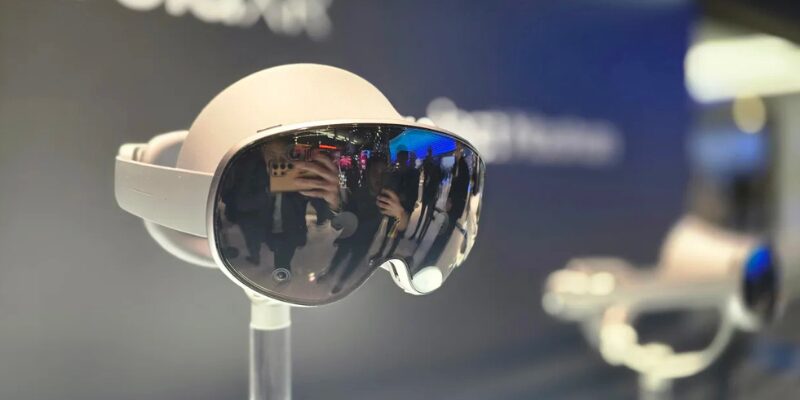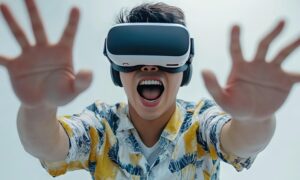A Samsung representative said on Tuesday that the company will introduce its extended reality headset this year.
TakeAway Points:
- Samsung will launch its extended reality headset this year, a spokesperson for the company said on Tuesday.
- The device, dubbed Project Moohan, is Samsung’s answer to Apple’s $3,500 Vision Pro, which was launched last year.
- Samsung teased the headset in 2024 but put it on display at this year’s Mobile World Congress in Barcelona.
Samsung’s extended reality headset
Samsung’s extended reality headset will be released this year, a company representative said on Tuesday.
device, dubbed Project Moohan, is Samsung’s answer to Apple’s $3,500 Vision Pro, which was launched last year.
Samsung teased the headset last year and put it on display at this year’s Mobile World Congress in Barcelona.
Samsung refers to the product as an “extended reality” or XR device, which aims to merge the digital and physical worlds. However, there are currently few details about the device. Four cameras are visible in the front lens of the physical headset, and there appear to be touch controls on the side.
Samsung worked alongside both Qualcomm and Google to develop a new kind of operating system for these kinds of devices, known as the Android XR platform.
In December, Samsung said Google Gemini would be installed in the headset, allowing wearers to experience a “conversation user interface.”
This would presumably enable users to interact with Gemini, Google’s AI assistant, to help navigate through apps and tasks. The cameras also suggest there will be some sort of gesture control similar to Apple’s Vision Pro.
“To me, the breakthrough technology is a combination of advanced vision capability with intelligence that understands user intention. I think without the intelligence part, it’s a defective product,” Patrick Chomet, executive vice president at Samsung’s mobile division, said in an interview on Tuesday.
Chomet hinted at a world envisioned by many consumer electronics firms, where smarter AI digital assistants are able to more intuitively understand user requirements on a device.
Samsung’s place in VR headset market and future devices
Samsung was one of the early players in virtual reality headsets, a market that never really took off the way many companies had predicted. But with technology advancing in areas from displays to chips, mixed or extended reality has been touted by big players as a new frontier in computing.
Samsung teased a future product roadmap during a January presentation when it launched its flagship S25 series of smartphones. One slide of the presentation showed outlines of future devices, including a trifold smartphone, similar to Huawei’s Mate XT, as well as the Project Moohan headset.
The final product was a pair of glasses, which could hint at a different type of future XR headset. Smart glasses offer similar experiences to a headset but without wearing a bulky device.
US communications agency to explore alternatives to GPS systems
The U.S. Federal Communications Commission said on Wednesday it plans to vote next month to explore alternatives to GPS after national security concerns have been raised about relying on a single system crucial to modern life.
GPS, short for global positioning system, is a network of satellites and receiving devices used for positioning, navigation and timing on Earth in everything from ships and planes to cars.
“Continuing to rely so heavily on one system leaves us exposed,” FCC Chair Brendan Carr said. “We need to develop redundant technologies.”
There have been reports of a rise in GPS interference around the world, particularly since 2023, known as spoofing, raising fears of an increased risk of accidents if planes veer off-course.
“Disruptions to GPS have the potential to undermine the nation’s economic and national security. And the risks to our current system are only increasing,” Carr said, noting President Donald Trump and a bipartisan group of lawmakers have called for action for years.
The FCC will vote on March 27 an inquiry to explore other Positioning, Navigation, and Timing (PNT) systems that can be complements or alternatives to GPS.
“We hope this effort will engage stakeholders across government and industry to encourage the development of new PNT technologies and solutions,” Carr said.
GPS is one of the more important navigation tools in aviation, which has replaced expensive ground devices that would transmit radio beams to guide planes towards landing but is fairly easy because GPS relies on signals broadcast from satellites in medium Earth orbit and are vulnerable to disruptions.
The Federal Aviation Administration said last year it was working with interagency and international partners on global navigation satellite system authentication capabilities to disrupt spoofing.





























